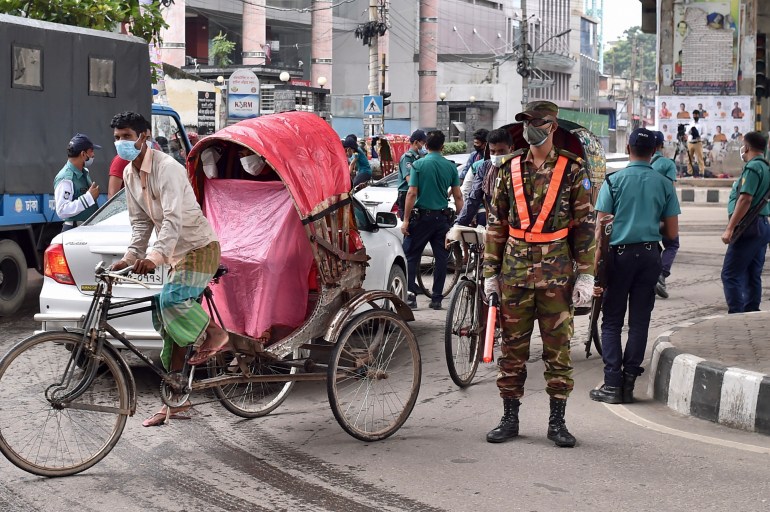Bangladesh deploys army as strict week-long COVID lockdown begins
Army troopers deployed to patrol alongside civilian forces during the shutdown beginning on Thursday.

Bangladesh has gone into a strict COVID-19 lockdown, with the army and police ordered to stop people leaving their homes except for emergencies or to buy essentials.
Army troopers have been deployed to patrol alongside civilian forces during the shutdown, which begins on Thursday.
Keep reading
list of 4 itemsIn Bangladesh’s empty Armenian church, a lone Hindu worshipper
Diarrhoea kills at least 4 Rohingya on remote Bangladesh island
Bangladesh cricketer Shakib suspended after umpire outburst
A government order said offices and transportation would be shut during the seven-day lockdown, which excludes the emergency services.
“No one will be allowed to leave home except for an emergency during this seven-day period,” the notice read.
Dhaka’s police chief told reporters anyone leaving home without reason would be fined and may face arrest. “If we need to file 5,000 cases and arrests a day, we will,” Shafiqul Islam told a news conference.

Al Jazeera’s Tanvir Chowdhury, reporting from capital Dhaka, said with the new restrictions in place, there is not much traffic on the roads.
“On typical business days, you would see a tailgate of traffic and you couldn’t even pass through it without spending half an hour or more to cross a block,” he said, standing at Airport Road, one of the bustling city’s busiest.
“Stores are closed except for kitchen markets, grocery stores and pharmaceutical stores.”
‘Alarming’ spike blamed on Delta variant
The government says the South Asian nation of 168 million people is seeing an “alarming and dangerous” rise in cases, blamed largely on the highly infectious Delta variant first identified in neighbouring India.
Hospitals are struggling, particularly in areas bordering India. Some rural towns have recorded infection rates of 70 percent.
The shutdown announcement last week sparked an exodus of migrant workers from Dhaka, with thousands cramming onto dangerously packed ferries.
Bangladesh has reported nearly 900,000 infections and just over 14,500 virus deaths, but experts say the actual toll could be much higher due to underreporting.
More than two-thirds of new virus cases in Dhaka are of the Delta variant, according to a recent study by the independent Dhaka-based International Centre for Diarrhoeal Disease Research.
The decision to implement the strict lockdown came after the Delta variant arrived amid loosely imposed restrictions, worsening the situation.
“We are hopeful these tough measures will work. We have to contain the virus at any cost,” health department spokesman Robed Amin told AFP news agency.
But Sagar, an 18-year-old street food seller in Dhaka, was angry.
“The government is imposing the lockdown only to kill the poor. There will be no work for us, no help from anyone,” he told AFP.

Excluded from the lockdown are garment factories supplying Western giants such as H&M and Walmart. The sector is a key exporter but faces stiff competition from China and Vietnam.
Touhidul Islam Chowdhury, who owns a small loan recovery firm, said the shutdown should be “enforced harshly”.
“A lot of people are dying and getting infected,” he told AFP. “The army should have deployed much earlier.”
Health authorities say they will resume the country’s inoculation drive from Thursday.
The first phase ground to a halt when India stopped exporting AstraZeneca vaccines earlier this year to focus on its domestic needs.
Bangladesh is expecting at the end of the week the first shipment of 2.5 million Moderna vaccines promised by the United States.
A Chinese embassy official has said Beijing is also sending about two million doses of Sinopharm vaccine that Dhaka bought, adding to 1.1 million shots already donated by China.
According to the health experts and government’s critics, a limited lockdown and lack of proper enforcement led to the spread of the virus in the country, Al Jazeera’s Chowdhury said.
“Unless there are stricter enforcements, the spread could result in Bangladesh seeing more lockdowns in the coming weeks and months.”